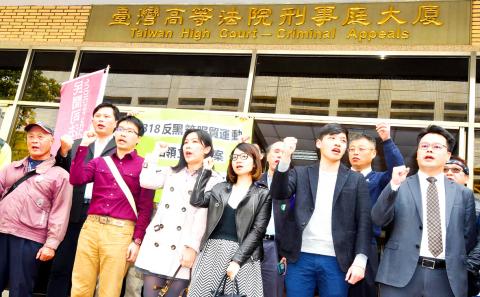The Taiwan High Court yesterday upheld the “not guilty” verdict for the 22 defendants who occupied the Legislative Yuan during a protest in 2014, saying they were exercising their right to political dissent and freedom of speech.
The 22 were first acquitted in March last year and public prosecutors are unlikely to appeal yesterday’s decision in accordance with the Criminal Speedy Trial Act (刑事妥速審判法) of 2010.
The defendants and other protesters stormed the legislature on March 18, 2014, and occupied the legislative chamber for almost 23 days in what became known as the Sunflower movement.

Photo: Liu Hsin-de, Taipei Times
The defendants included members of different activist groups, such as Lin Fei-fan (林飛帆), Chen Wei-ting (陳為廷), Huang Kuo-chang (黃國昌), Tsay Ting-kuei (蔡丁貴) and Wei Yang (魏揚). While the Taipei District Court acquitted the group on charges of “civil disobedience,” the High Court based its decision on the protection of freedom of speech and right to dissenting views.
Reading the court’s ruling, High Court spokesman Chiu Chung-yi (邱忠義) said that the defendants acted in response to Chinese Nationalist Party (KMT) Legislator Chang Ching-chung (張慶忠) and other KMT lawmakers’ rush to pass the cross-strait service trade agreement draft bill through a legislative subcommittee without following proper procedures.
The defendants’ action “did not cause any clear and immediate danger,” Chou said, adding that according to Council of Grand Justices’ Interpretation No. 455, the defendants should be given protection under freedom of speech, for which they should not be oppressed or punished in the aftermath of their undertaken acts.
The High Court determined that the group was “urging other protesters to enter the legislature together as a group to express their discontent and opposition to the cross-strait agreement.”
“They were not maligning and vilifying indiscriminately, nor did they incite the crowd to commit acts of violence against the government,” the ruling said.
“At that time, the draft bill was headed for a vote in the legislature within three days. The defendants decided that occupying the legislature was their only recourse, as they perceived there was insufficient time and no other effective way to block the draft bill,” it said.
“That people can express contrary opinions on public affairs issues demonstrates the freedom of expression that Taiwan’s society has fought to earn through very difficult circumstances,” it said.
“The acquittal proves that the cross-strait agreement had done grave harm to our constitutional democracy. We are not guilty, but the real guilty ones are [then-president] Ma Ying-jeou (馬英九) and his government, and KMT Legislator Chang Ching-chung, who tried to ram the draft bill through by using illegal and unconstitutional means,” said Huang, now New Power Party executive chairman.
Chen said the ruling serves as a message to Chinese President Xi Jinping (習近平) “that you could be an emperor and extend your rule indefinitely, but Taiwan is a democratic nation.”
“Xi should not infringe on Taiwan’s territory, because Taiwanese will rise and fight, and our democracy and the judiciary will protect the public’s rights,” Chen said.

SECURITY: As China is ‘reshaping’ Hong Kong’s population, Taiwan must raise the eligibility threshold for applications from Hong Kongers, Chiu Chui-cheng said When Hong Kong and Macau citizens apply for residency in Taiwan, it would be under a new category that includes a “national security observation period,” Mainland Affairs Council (MAC) Minister Chiu Chui-cheng (邱垂正) said yesterday. President William Lai (賴清德) on March 13 announced 17 strategies to counter China’s aggression toward Taiwan, including incorporating national security considerations into the review process for residency applications from Hong Kong and Macau citizens. The situation in Hong Kong is constantly changing, Chiu said to media yesterday on the sidelines of the Taipei Technology Run hosted by the Taipei Neihu Technology Park Development Association. With

CARROT AND STICK: While unrelenting in its military threats, China attracted nearly 40,000 Taiwanese to over 400 business events last year Nearly 40,000 Taiwanese last year joined industry events in China, such as conferences and trade fairs, supported by the Chinese government, a study showed yesterday, as Beijing ramps up a charm offensive toward Taipei alongside military pressure. China has long taken a carrot-and-stick approach to Taiwan, threatening it with the prospect of military action while reaching out to those it believes are amenable to Beijing’s point of view. Taiwanese security officials are wary of what they see as Beijing’s influence campaigns to sway public opinion after Taipei and Beijing gradually resumed travel links halted by the COVID-19 pandemic, but the scale of

A US Marine Corps regiment equipped with Naval Strike Missiles (NSM) is set to participate in the upcoming Balikatan 25 exercise in the Luzon Strait, marking the system’s first-ever deployment in the Philippines. US and Philippine officials have separately confirmed that the Navy Marine Expeditionary Ship Interdiction System (NMESIS) — the mobile launch platform for the Naval Strike Missile — would take part in the joint exercise. The missiles are being deployed to “a strategic first island chain chokepoint” in the waters between Taiwan proper and the Philippines, US-based Naval News reported. “The Luzon Strait and Bashi Channel represent a critical access

Pope Francis is be laid to rest on Saturday after lying in state for three days in St Peter’s Basilica, where the faithful are expected to flock to pay their respects to history’s first Latin American pontiff. The cardinals met yesterday in the Vatican’s synod hall to chart the next steps before a conclave begins to choose Francis’ successor, as condolences poured in from around the world. According to current norms, the conclave must begin between May 5 and 10. The cardinals set the funeral for Saturday at 10am in St Peter’s Square, to be celebrated by the dean of the College